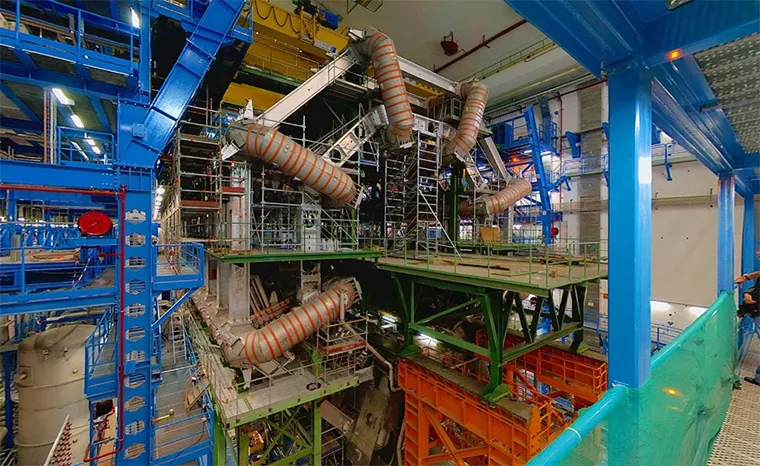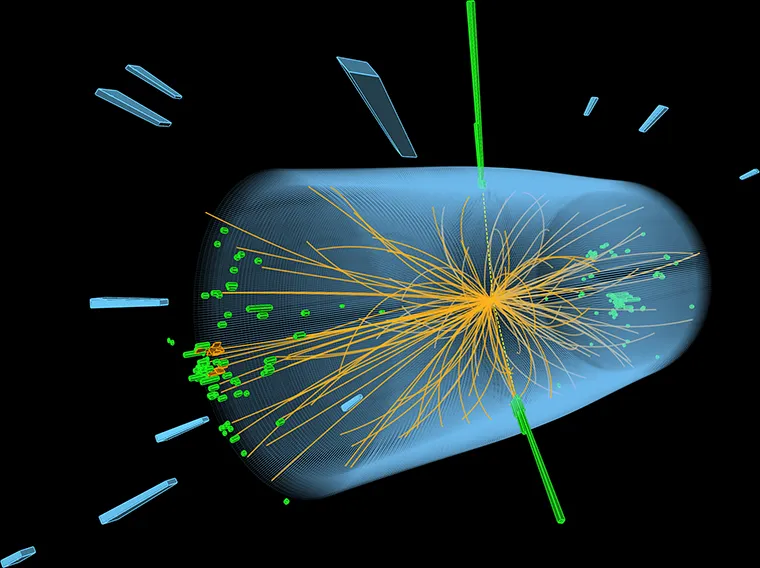Lifeboat Foundation ParticleAcceleratorShield
By the Lifeboat Foundation Scientific Advisory Board. This is an ongoing program so you may submit suggestions to programs@lifeboat.com.
The ATLAS detector at the LHC is pretty big but perhaps that is because the LHC spans two countries!
Overview
Our goal is to prevent, and also make plans on surviving when possible, particle accelerator mishaps including quantum vacuum collapse, mining the quantum vacuum, formation of a stable strangelet, and the creation of artificial mini-black holes.

The ATLAS detector of the Large Hadron Collider (LHC) under construction. The LHC is 27 kilometers (16.7 miles) long and spans two countries.
Enter 3D panoramas with sound!
- Lords of the Ring
- The ATLAS Experiment Movie
- ATLAS – Episode I: A New Hope
- ATLAS – Episode II: The Particles Strike Back
- Click on parts of the detector for their name and description
- Video clips
- Anatomy of a black hole (interactive animation)
- Large Hadron Rap: Rappin’ about CERN’s Large Hadron Collider!
Higgs Boson

A candidate event for the decay of the Higgs boson to two photons in the CMS detector (3D view) from 2020.
The decay of the Higgs boson was first detected in 2012 when the Higgs boson itself was discovered at CERN’s Large Hadron Collider by both the CMS and ATLAS detectors.
The Higgs boson was a hypothetical massive scalar elementary particle predicted to exist by the Standard Model of particle physics. It was the last Standard Model particle to be observed (in 2012), and plays a key role in explaining the origins of the mass of other elementary particles, in particular the difference between the massless photon and the very heavy W and Z bosons.
Elementary particle masses, and the differences between electromagnetism (caused by the photon) and the weak force (caused by the W and Z bosons), are critical to many aspects of the structure of microscopic (and hence macroscopic) matter; thus the Higgs boson has an enormous effect on the world around us.
Artificial Mini-Black Holes
Some people are worrying about the world’s next-generation particle collider, the Large Hadron Collider, which is now operating at CERN’s facility on the Franco-Swiss border. The LHC site says:
“According to some theoretical models, tiny black holes could be produced in collisions at the LHC. They would then very quickly decay into what is known as Hawking radiation (the tinier the black hole, the faster it evaporates) which would be detected by experiments.”
But some scientists have pointed out that Hawking radiation may not exist as documented in the scientific papers Do black holes radiate? and On the Universality of the Hawking Effect.
Dangers
“It is not inconceivable that physics could be dangerous too. Some experiments are designed to generate conditions more extreme than ever occur naturally. Nobody then knows exactly what will happen. Indeed, there would be no point in doing any experiments if their outcomes could be fully predicted in advance. Some theorists have conjectured that certain types of experiment could conceivably unleash a runaway process that destroyed not just us but Earth itself.”
“There have been speculations that future high-energy particle accelerator experiments may cause a breakdown of a metastable vacuum state that our part of the cosmos might be in, converting it into a ‘true’ vacuum of lower energy density. This would result in an expanding bubble of total destruction that would sweep through the galaxy and beyond at the speed of light, tearing all matter apart as it proceeds.”
Although neither Lord Martin Rees nor Nick Bostrom are greatly concerned by this potential problem, there is a reason that they call the actions done by the LHC “experiments”. If the outcome of an experiment was known beforehand, it would not be called an experiment! What are your thoughts on the experiments that will be conducted at the LHC? hy and productive life at any age.